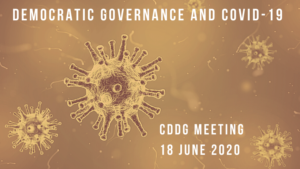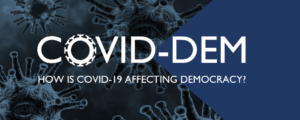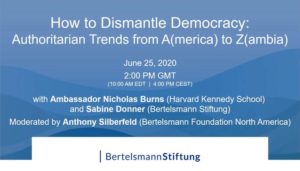 While the coronavirus pandemic is many stresses that afflict democracy in Europe, it is also propelling democratic efforts in a number of areas, notes Richard Youngs, a senior fellow in the Democracy, Conflict, and Governance Program, based at Carnegie Europe.
While the coronavirus pandemic is many stresses that afflict democracy in Europe, it is also propelling democratic efforts in a number of areas, notes Richard Youngs, a senior fellow in the Democracy, Conflict, and Governance Program, based at Carnegie Europe.
A new collection of essays shows not only that the coronavirus aggravates many of the stresses that afflict European democracy but also that a measured perspective is required: many of the heightened risks are of an indirect or second-order nature. Counterbalancing emergent threats, the crisis has been sobering enough to propel many democratic reform efforts—in civil society, political opposition forces, and the digital sphere, he writes, adding that the collection explores:
- what democratic rights have and have not been put at risk;
- how the coronavirus might lead to new forms of European integration;
- how the pandemic has affected European civil society;
- the incipient turn to more technocratic governance;
- the changing face of digital democracy;
- the dangers of misinformation and divisive messaging;
- political dynamics in three individual European countries: Germany, which is widely assumed to have performed well in the crisis, and Hungary and Poland, where democracy is most acutely menaced.
The series concludes with thoughts on how a better European democratic strategy can be an integral part of coronavirus responses over the longer term, adds Youngs.
 If the public does not understand the importance and value of democratic freedoms, it becomes easier for political movements with authoritarian ambitions to misrepresent and, ultimately, dismantle those freedoms, notes Israel Butler, the head of advocacy at the Civil Liberties Union for Europe. By framing freedoms as tools to navigate the pandemic, societies not only improve their well-being now but also contribute to building the public support needed to sustain rights and the institutions that protect them in the long run. RTWT
If the public does not understand the importance and value of democratic freedoms, it becomes easier for political movements with authoritarian ambitions to misrepresent and, ultimately, dismantle those freedoms, notes Israel Butler, the head of advocacy at the Civil Liberties Union for Europe. By framing freedoms as tools to navigate the pandemic, societies not only improve their well-being now but also contribute to building the public support needed to sustain rights and the institutions that protect them in the long run. RTWT
There is already evidence of a rise in toxic polarization across European societies between those who support restrictive measures against the coronavirus and those who do not believe in the danger of the virus, note V-Dem Institute analysts Anna Lührmann, Amanda B. Edgell, Sandra Grahn, Jean Lachapelle and Seraphine F. Maerz. The first group is upset about the reluctance of the second to follow physical distancing orders, while those in the second group see any government regulation on the topic as an unjust infringement of their personal freedom. This potentially explosive cocktail risks undermining a key foundation of democracy: trust and public belief in the legitimacy of government actions.
 How a country conducts an election during a crisis says a lot about the quality and inclusivity of its democracy, argues Isabel Linzer, Research Analyst on Technology and Democracy for Freedom House. In the United States, the question boils down to whether political leaders will allow the pandemic to exacerbate the existing disenfranchisement and marginalization of Black citizens, or take the steps necessary to address racial inequities built into the electoral system. Although COVID-19 poses a threat, it also offers a chance to rethink and expand voter participation, making elections more democratic for the long haul, she contends.
How a country conducts an election during a crisis says a lot about the quality and inclusivity of its democracy, argues Isabel Linzer, Research Analyst on Technology and Democracy for Freedom House. In the United States, the question boils down to whether political leaders will allow the pandemic to exacerbate the existing disenfranchisement and marginalization of Black citizens, or take the steps necessary to address racial inequities built into the electoral system. Although COVID-19 poses a threat, it also offers a chance to rethink and expand voter participation, making elections more democratic for the long haul, she contends.
The Council of Europe recently published a Toolkit for member States on “Respecting democracy, rule of law and human rights in the framework of the COVID-19 sanitary crisis”, highlighting innovative responses by member States.
The latest Transformation Index by Germany’s Bertelsmann Stiftung found that the effects of the coronavirus pandemic could further threaten democracy worldwide.  Restrictions of democratic rights, rampant corruption and deepening polarization are interlinked and mutually reinforce each other. Ambassador Nicholas Burns, BTI’s Sabine Donner and Tony Silberfeld will shed light on authoritarian trends worldwide. Register here.
Restrictions of democratic rights, rampant corruption and deepening polarization are interlinked and mutually reinforce each other. Ambassador Nicholas Burns, BTI’s Sabine Donner and Tony Silberfeld will shed light on authoritarian trends worldwide. Register here.
*TABLE OF CONTENTS
-
Does the Coronavirus Endanger Democracy in Europe? ANNA LÜHRMANN, ET AL
-
Coronavirus and Europe’s Incomplete Union ALBERTO ALEMANNO
-
Coronavirus and European Civil Society AARTI NARSEE
-
Technocracy and Populism After the Coronavirus HANS KUNDNANI
-
Digital Divides and the Coronavirus CARME COLOMINA
-
Democracy and the Coronavirus Infodemic PETROS FASSOULAS
-
The Myth of German Coronavirus Exceptionalism MICHAEL MEYER-RESENDE
-
Coronavirus and Democratic Erosion in Hungary ISTVÁN HEGEDŰS
-
Poland’s Democratic Slide During the Coronavirus PAWEŁ MARCZEWSKI
-
A Democratic Narrative for the Coronavirus ISRAEL BUTLER







